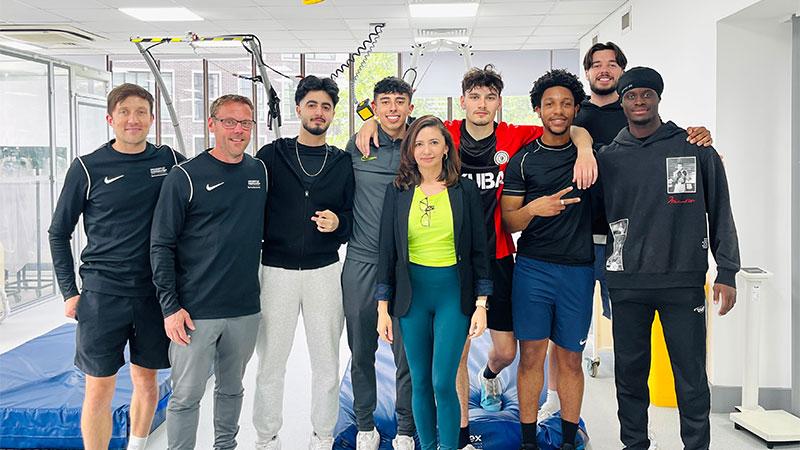Sport and Exercise Nutrition MSc students from the University of Westminster recently applied their skills beyond the classroom by conducting fitness tests for first team players from Elneny Football Club.

The team of students conducted fitness assessments in the University’s Human Performance Laboratory, measuring the player’s key performance indicators including body composition, power and their VO2 max which indicates their endurance levels.
The fitness assessment day was an integral part of the Sports and Exercise Nutrition MSc work experience programme, led by Paul Hough , Lecturer in Sport and Exercise Physiology, and funded through the Quintin Hogg Trust’s Small Projects initiative.
Elneny Football Club, founded in 2023 by former Arsenal midfielder Mohamed Elneny, offers coaching for all age groups and provides a second chance to young players released from professional football clubs. By collaborating with Westminster students, the club is embracing cutting-edge sports science to enhance player development while offering students work experience and research opportunities.
Supporting the postgraduate students were undergraduate Human Nutrition BSc Honours students Heidi Betancourt Cordoba and Josiah Isaac, who recently completed an Exercise Physiology module as part of their degree. In September, Heidi will begin her undergraduate research project with Eleny players, exploring the role of nutrigenomics in football performance and recovery. The research aims to examine how dietary strategies, tailored to an individual’s genetic profile, can optimise performance and recovery.
Heidi said: "Conducting fitness test on young football players in the University’s exercise lab has been an invaluable experience, as it allowed me to apply key skills from the Exercise Physiology module, such as executing testing procedures and interpreting physiological data. This experience bridges the gap between theory and real-world application and has prepared me for the challenges of real-life practice in Nutrition, Health and Sports Sciences. I am grateful of having the best support and mentorship from Paul and his colleagues in supporting my learning and research.”
Paul Hough added: “This hands-on experience is essential for our students, allowing them to apply their knowledge in real-world settings and develop the skills needed to excel in Sports Science and Nutrition careers.”
This programme directly contributes to the United Nations Sustainable Development Goals (SDG) 3: Good Health and Wellbeing, 4: Quality Education and 8: Decent Work and Economic Growth. Since 2019, the University of Westminster has used the SDGs holistically to frame strategic decisions to help students and colleagues fulfil their potential and contribute to a more sustainable, equitable and healthier society.
Find out more about Nutrition and Public Health courses at the University of Westminster.





